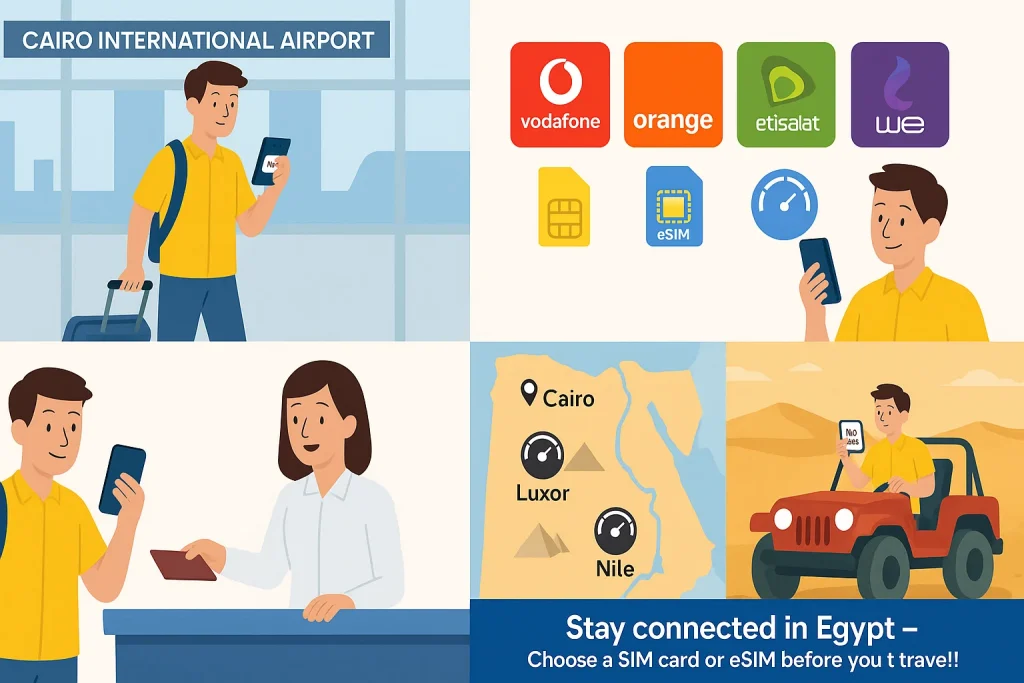
Imagine standing in front of the Pyramids of Giza, ready to share that perfect photo, but your phone says “No Service.” Frustrating, right? When traveling in Egypt, having reliable internet is more than just a convenience—it’s your lifeline for navigation, booking tours, staying in touch with family, and even making secure payments.
Over the past 10 years of helping travelers prepare for Egypt, one of the most frequent questions I get is: “What’s the best way to stay connected while in Egypt?” Should you rely on roaming, buy a local SIM card, or get an eSIM? In this guide, I’ll walk you through everything you need to know about Egypt SIM cards & internet so you can enjoy your trip without connectivity headaches.
You’ll learn about the best providers, costs, where to buy a SIM, and some insider tips from real traveler experiences. By the end, you’ll know exactly how to stay connected while traveling in Egypt.
Why You Shouldn’t Rely on International Roaming
Before we talk about local SIMs and internet, let’s address international roaming. Most major carriers offer roaming packages for Egypt, but they tend to be expensive and sometimes unreliable.
For example, one of my US-based clients thought their roaming package would cover their week in Cairo. After just three days of Google Maps, WhatsApp calls, and Instagram uploads, they received a shocking $200 roaming bill.
The reality: Roaming is fine for emergencies, but not for everyday use. Buying a local SIM card or eSIM is almost always cheaper and gives you better coverage.
The Major Mobile Networks in Egypt
Egypt has four main telecom providers:
- Vodafone Egypt – Known for wide coverage, especially in urban areas. Great for tourists who plan to stay in Cairo, Luxor, or Alexandria.
- Orange Egypt – Offers good internet speed and reliable service in most tourist areas.
- Etisalat Misr – Competitive data packages, strong coverage in major cities.
- WE (Telecom Egypt) – The newest operator, often cheaper, but coverage can be patchy outside big cities.
Personal insight: From my experience, Vodafone and Orange are the most reliable choices for travelers. Clients who’ve used Vodafone in Cairo and Luxor had almost no issues with connectivity, while a couple using WE reported weak signals in the desert near Aswan.
Where to Buy Egypt Sim Cards & Internet
You have several options for buying SIM cards in Egypt:
At the Airport
- Cairo International Airport, Hurghada, and Sharm El Sheikh all have official telecom shops in the arrival halls.
- The convenience is great, but prices may be slightly higher than in the city.
At City Stores
- You can find Vodafone, Orange, Etisalat, and WE shops in malls and city centers.
- Bring your passport—SIM card registration is mandatory.
- Packages tend to be cheaper here compared to the airport.
Pro tip: Always buy SIM cards from official stores or airport counters, not random kiosks. I’ve heard stories of tourists being sold used SIMs that didn’t work.
eSIM Options for Egypt
If your phone supports eSIM (like recent iPhone and Samsung models), you might not even need a physical SIM. Several global providers offer Egypt eSIMs that you can activate before you land.
Benefits of eSIMs:
- No need to swap SIM cards.
- Activate instantly with a QR code.
- Multiple package options (daily or weekly data).
Example: One of my clients, a solo traveler from India, bought an eSIM online before flying. The moment she landed in Cairo, she was connected—no waiting at counters, no paperwork.
Downside: Local physical SIMs usually give you more data at a lower cost compared to international eSIM providers.
Costs and Data Packages
As of 2025, here’s what you can expect to pay for SIM cards in Egypt:
- Vodafone Egypt: Around $5–10 for a SIM with 10–15GB of data.
- Orange Egypt: Similar prices, with packages starting at $5.
- Etisalat Misr: Slightly cheaper bundles, $4–8 for 10GB.
- WE (Telecom Egypt): Often runs promotions with large data bundles for $5–7.
Pro tip: Many travelers find that 10–15GB is enough for a one-week trip if you mainly use it for maps, messaging, and social media. But if you’re working remotely or streaming, go for 30GB or more.
Internet Speeds and Coverage
Egypt’s internet is generally good in major cities and tourist areas. In Cairo, Luxor, Aswan, and Alexandria, you’ll get 4G speeds with Vodafone and Orange.
- Urban Areas: Reliable 4G speeds, perfect for video calls and streaming.
- Tourist Sites: Good around Giza, Luxor temples, and Nile cruises.
- Desert & Rural Areas: Coverage drops significantly. Don’t expect strong internet in remote desert tours or while crossing long stretches of road.
Real-life example: A couple I assisted took a desert safari in the White Desert. Their Vodafone SIM worked fine in Cairo, but during the safari, they had no signal for hours. If you’re planning such trips, prepare to be offline.
Free Wi-Fi in Egypt: Can You Rely on It?
While hotels, cafes, and airports in Egypt offer free Wi-Fi, it’s often slow and unreliable.
- Hotels: Wi-Fi usually works in the lobby but may be weak in rooms.
- Cafes: Chains like Starbucks and Costa Coffee offer Wi-Fi, but you’ll need a local phone number to receive login codes.
- Airports: Free Wi-Fi is available, but connections can be patchy.
Bottom line: Free Wi-Fi is helpful but not dependable for navigation or constant communication. A SIM card or eSIM is essential.
Tips for Using Internet Safely in Egypt
Staying connected also means staying secure:
- Use a VPN when accessing sensitive accounts. Public Wi-Fi is not always safe.
- Download maps offline in Google Maps before heading out to areas with weak coverage.
- Avoid streaming in HD if you’re on limited data—Egyptian data bundles are affordable but not unlimited.
Pro tip: Always keep an offline copy of your e-visa approval email and passport scan in case you lose internet access.
Staying connected in Egypt doesn’t have to be complicated. The best option for most travelers is to buy a local SIM card from Vodafone or Orange upon arrival. If you prefer convenience, an eSIM is also a solid choice, though usually a bit pricier.
With the right SIM card and data package, you’ll have reliable internet for maps, calls, bookings, and sharing your adventures in real time.
As someone who has guided travelers through Egypt for over a decade, my strongest advice is this: plan your connectivity before you land. It saves you money, time, and unnecessary stress.
👉 Need help securing your visa and planning a smooth trip? Check out our page and let us take care of the paperwork so you can focus on enjoying Egypt.

You can explore Egypt’s top destinations here
Frequently Asked Questions
1. Can I use my own SIM card from home in Egypt?
Yes, but international roaming is usually expensive. Buying a local SIM card or eSIM is more cost-effective and reliable.
2. Which SIM card is best for tourists in Egypt?
Vodafone and Orange are generally the best for coverage and speed in major tourist destinations.
3. Do I need my passport to buy a SIM card in Egypt?
Yes. SIM cards must be registered with your passport at official telecom stores or airport counters.

